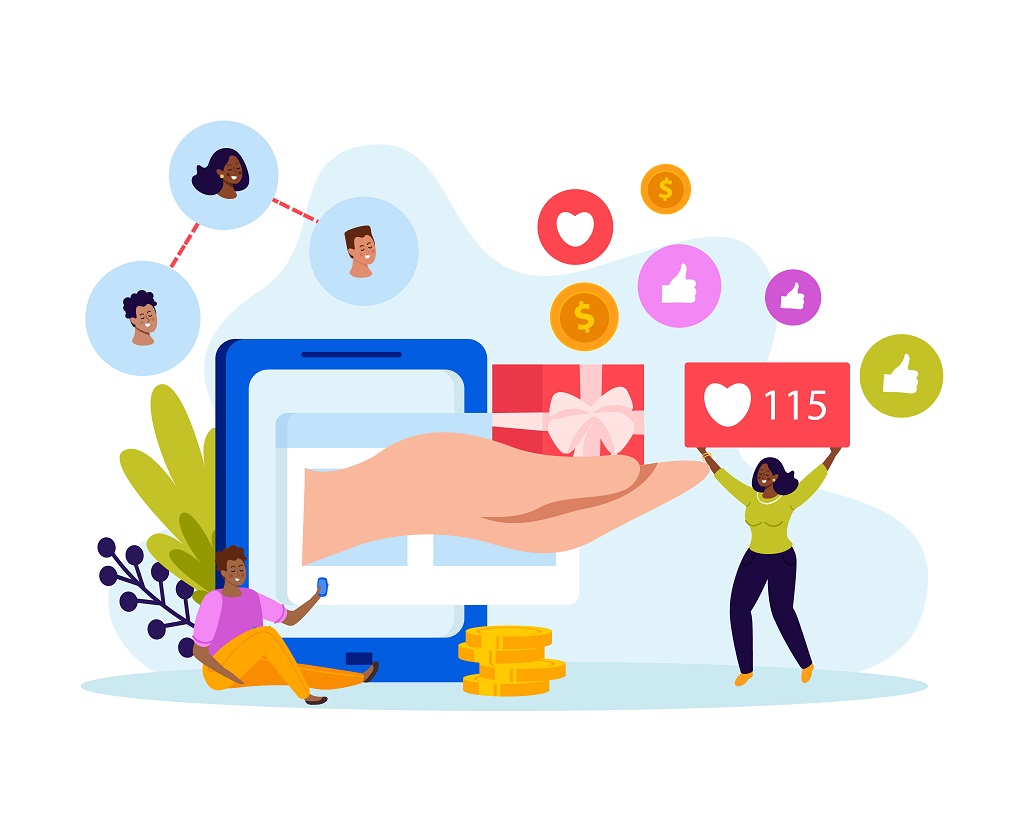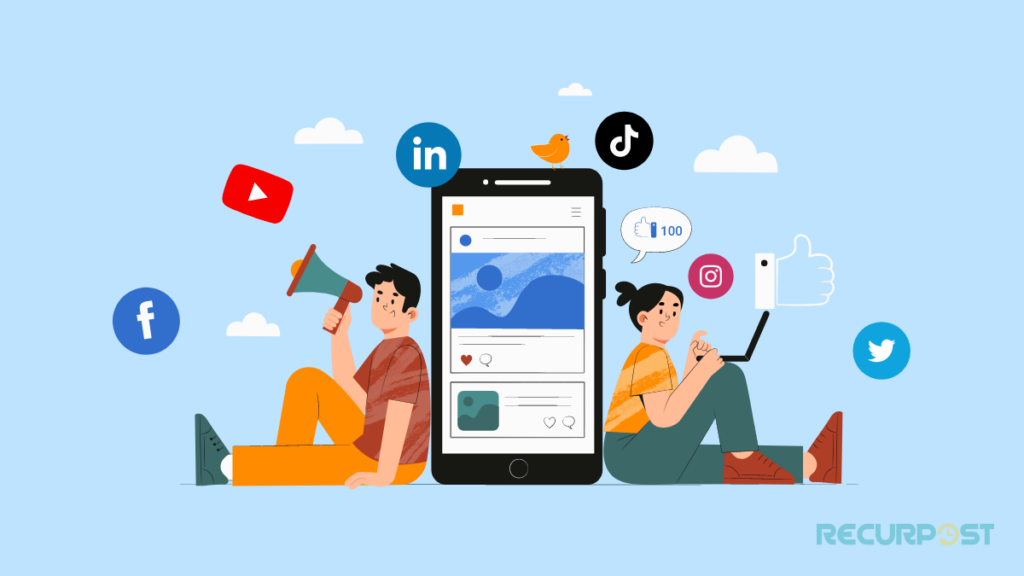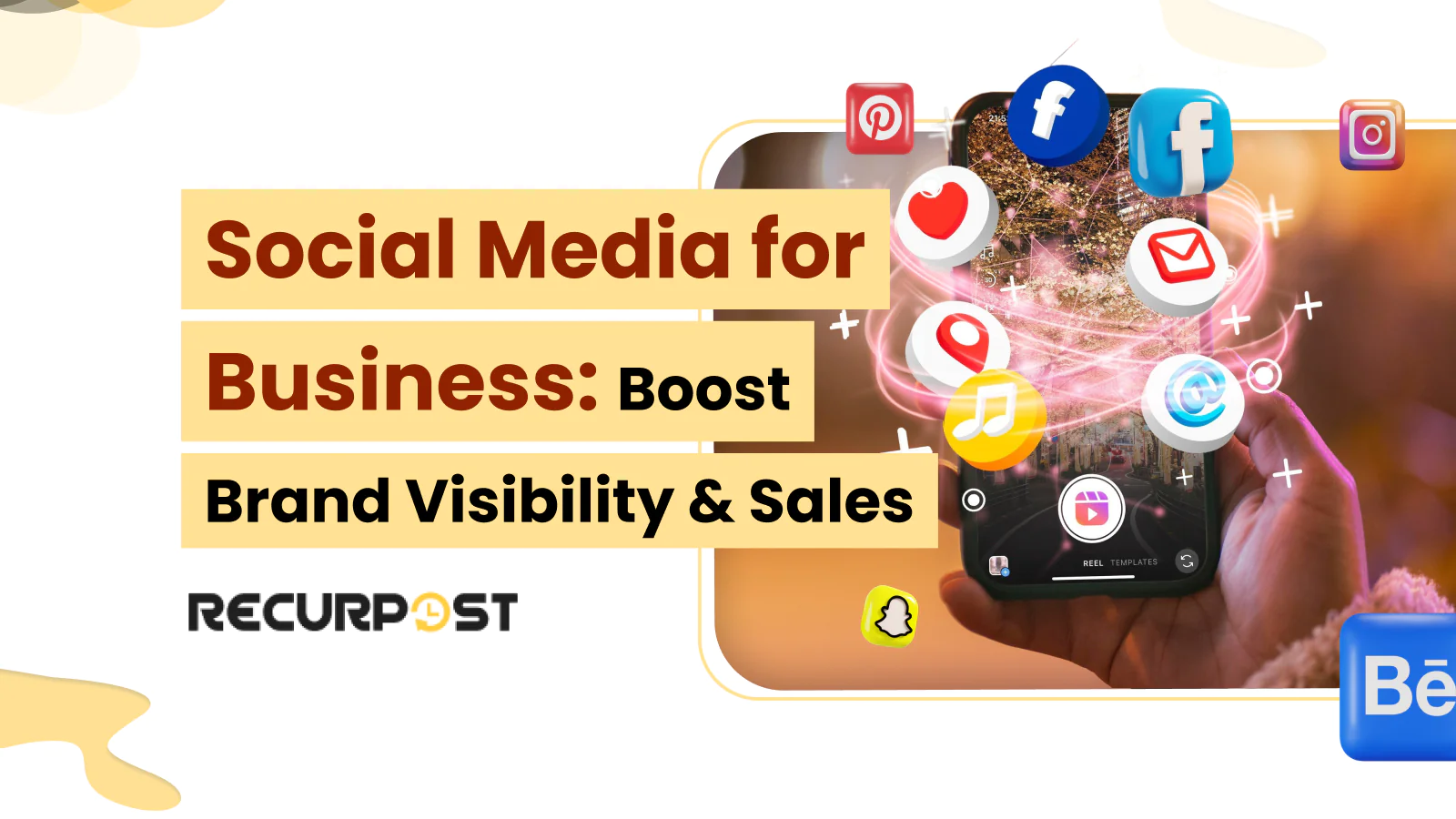Imagine spending just 6 hours a week to boost your company’s visibility, traffic, and sales. All while using social media for business at no cost. Roughly 90% of marketers say social media for business gives companies massive brand visibility
Every modern marketing strategy involves time spent scheduling posts through a social media management tool. The benefits of social media for business are huge, making this budget-friendly tool essential for businesses of all sizes.
It’s clear that social media marketing for businesses is vital to success. Many marketers recognize how social media for small businesses drives business growth. Still, some professionals remain unsure which social media strategies deliver the strongest outcomes.
According to Social Media Examiner, 96% of marketers use social media marketing, yet 85% still struggle to pinpoint which techniques work best. This article explores the benefits of social media marketing for small businesses and how to leverage social media for business effectively.
Why is social media good for businesses?

Building an effective social media strategy for business takes creativity and careful planning. About 92% of marketers include social media in business marketing strategies. Still, many companies don’t fully understand the benefits of social media for businesses or how social media marketing for small businesses drives results.
Nearly 40% of small businesses still lack a social media presence, and 16% say they won’t use social media for business. This gap highlights the difference between companies that understand the importance of social media for small businesses and those unsure how to start. The next sections will explain how social media for small business marketing boosts visibility, trust, and business growth.
What are the benefits of social media marketing?

Social media for business remains one of the most cost-effective platforms for brand marketing, offering unmatched reach and variety. Here are the core benefits of social media marketing for businesses:
- Humanise your company: With social media in business, you can give your brand a voice. Posts, profiles, and interactions shape a persona your audience can relate to, trust, and stay engaged with.
- Increase Traffic: One major benefit of social media for business is how easily it drives traffic to your site. Profile links, blog shares, and ads help turn visitors into buyers.
- Generate leads and customers: Tools like Instagram and Facebook Shops, CTAs, messaging, and booking features help small businesses using social media convert leads within the platforms themselves.
- Increase brand recognition: The visual power of social media for small businesses helps create a distinct identity. Better brand awareness fuels stronger performance across all marketing efforts.
- Build relationships: Social media marketing for small businesses lets you connect with your audience in real-time. You can network, listen, reply, and start conversations that build lasting trust.
An engaged social media following for business makes reaching your marketing goals faster and more efficiently.
Benefits of Social Media in Business

Social media for business powers communication, customer engagement, and modern marketing strategies across industries.
When used strategically, the advantages of social media for businesses far outweigh any drawbacks.
Companies use social media for business to boost brand awareness, connect with customers, and elevate overall marketing efforts.
Social media for businesses delivers powerful benefits to companies of all sizes, including:
- Increased Brand Visibility: Social media for business platforms helps companies showcase products, services, and brand identity to a wide audience. By sharing consistent, engaging content, businesses can boost visibility on social media and connect with potential customers.
- Enhanced Customer Engagement: With social media in business, companies can reply to queries, build trust, and create stronger customer relationships. This often leads to loyalty and brand advocacy.
- Improved Customer Insights: Social media management for small businesses includes access to analytics that reveal customer preferences, behavior, and key pain points. These insights help refine marketing plans and drive smarter product decisions.
- Cost-Effective Marketing: Compared to traditional advertising methods, social media marketing can be a more cost-effective way to reach and engage with customers on social media. Many social media platforms offer affordable advertising options and the ability to target specific audience segments.
Why is Social Media Important for Small Businesses?

Small businesses face specific challenges with marketing and gaining customers. Social media for small businesses evens the playing field, helping them compete with big brands effectively.
Here’s why social media for small businesses delivers huge value:
- Limited Marketing Budgets: Social media for business offers a low-cost path to reach large audiences. For small business marketing on social media, it beats traditional ads on value and flexibility.
- Personalized Interactions: With social media management for small businesses, owners can engage customers directly, build stronger bonds, and drive brand loyalty through authentic conversations.
- Increased Credibility: A visible social media presence for small businesses boosts trust and legitimacy. This is vital for startups and lesser-known brands trying to establish authority.
- Targeted Advertising: Social media advertising for small businesses provides laser-focused targeting. It helps brands connect with ideal customers and improve campaign performance on a budget.
Why Social Media Marketing is Important for Business
Social media marketing for business is now a core part of every modern strategy. Here’s how social media helps businesses grow with major benefits:
- Increased Brand Awareness: With consistent posting on social media for business, companies boost visibility and connect with broader audiences. This raises brand recognition across every touchpoint.
- Improved Lead Generation: Social media marketing for small businesses supports lead generation using targeted ads and engaging content to pull in the right customers.
- Enhanced Customer Relationships: Using social media for business opens direct lines to customers. Quick responses, genuine engagement, and regular updates build loyalty and trust.
- Competitive Advantage: Businesses using social media effectively stay ahead by maximizing online presence and customer interaction, giving them a clear edge in crowded markets.
Why Social Media Engagement is Important for Your Business
Engaging with your audience through social media for business builds loyalty, trust, and real growth. Here’s why social media engagement for small businesses is essential:
- Improved Customer Satisfaction: Quick replies to feedback on business social media accounts show customers their opinions matter. It boosts service quality and signals that your business cares.
- Increased Brand Loyalty: Meaningful interaction via social media for small businesses helps build emotional connections, increasing customer loyalty and repeat purchases over time.
- Enhanced Reputation: Engaging on social media for business shapes how people perceive your brand. Responsive businesses are more trusted and recommended by their audience.
- Better Insights: Through social media engagement for small businesses, companies gain insight into customer needs and sentiment. This data sharpens your content strategy, product offerings, and marketing focus.
Importance of Social Media Communication in Business
Successful businesses rely on strong communication, and social media for business has become a vital tool. Here’s why social media communication is important for businesses today:
- Real-Time Interactions: Using social media in business communication allows companies to respond instantly to customers and stakeholders. It supports fast answers, timely updates, and improved service.
- Improved Transparency: Open, authentic social media business communication builds trust. Transparency helps businesses connect genuinely with their audience and earn long-term credibility.
- Wider Reach: With social media for small businesses, messages reach beyond the limits of traditional channels. These platforms enable wider, more diverse audience engagement at scale.
- Cost-Effective Collaboration: Social media tools can facilitate cost-effective collaboration within a social media team structure, enabling businesses to improve internal social media communication in business and streamline decision-making processes.
What is the importance of Social media for startups?

Consider these facts when adopting social media for business in your startup strategy:
- According to Data Reportal, 4.48 billion people now use social media platforms worldwide.
- Nearly 73% of marketers believe that social media marketing for businesses has helped them grow their firms.
These stats show how social media for startups boosts sales and revenue. Key aspects of its importance include:
Brand awareness
Brand recognition is among the top benefits of social media for startups. Major brands rely on Facebook and Instagram to promote their products and services.
Consider this social media for business example: Clinique ran Facebook ad campaigns across 20 countries, resulting in a 13-point increase in ad recall and a 36-point boost in add-to-carts. Additionally, 44% of local businesses use social media to promote their brand, making it a hotspot for company growth.
Direct communication
Communication is essential to business relationships. Social media in business removes middlemen, allowing brands to connect with customers directly.
While Google leads in searches, 90% of customers have used social media for business communication. In addition, 63% expect brands to offer support via social platforms.
To build brand value, businesses must use social media for customer service to gather feedback and resolve issues quickly.
High traffic at a low price
Startups and small businesses often deal with tight budgets. Social media marketing offers a cost-effective alternative to traditional ads, delivering strong reach without overspending.
Platforms like Facebook and Instagram allow budget control for paid campaigns. Even organic social media strategies yield strong results, helping you save while growing.
With strategic planning and good content, social media for business growth delivers higher ROI. Eye-catching visual content increases reach and draws in potential customers.
These reasons explain why social media is important for small businesses and startups. Up next: actionable social media for business ideas and platform-specific benefits.
A solid social media presence for startups builds awareness, engages customers, and scales business affordably. Being where your audience spends time drives real connections and long-term growth.
Social media relevance is essential in today’s landscape. With billions online daily, businesses need social media visibility to compete, grow, and serve customers effectively.
The best social media marketing platforms for business

The top social media platforms for business include Facebook, YouTube, Instagram, LinkedIn, Twitter, TikTok, and Snapchat. Each offers unique strengths based on users, tone, benefits, and ideal content types.
Facebook, the world’s largest social media platform for business directories, caters to a broad audience. Users connect, join groups, follow brands, and find local businesses. It’s great for:
- Building customer relationships
- Sharing updates and milestones
- Hosting live streams and discussions
- Targeting older demographics
Since Facebook’s organic reach is limited, social media advertising for small businesses is often needed to generate leads and reach new audiences.
YouTube
YouTube doubles as a social media for business and a content platform. Users can post, follow, comment, and interact. Don’t aim to go viral: focus on value. YouTube works well for:
- Educational video content
- Interactive shopping streams
- Targeted video ads and display banners
- SEO gains, as video ranks high in “how-to” searches
Instagram reached one billion users by 2018, surpassing LinkedIn and Twitter. Known for Reels, Stories, and Feeds, it’s a key platform in social media marketing for small businesses. Use it for:
- Social commerce
- Influencer campaigns
- Sharing customer-created content
- Showcasing brand personality
Instagram ads cost more than Facebook, but organic reach is stronger and making it ideal for growing a business on social media.
LinkedIn is more than networking. It’s a hub for leadership, culture, and B2B social media marketing. Companies use it to build trust and express brand values. Use LinkedIn to:
- Recruit top talent
- Connect with peers and clients
- Share business updates and culture
- Publish insights and articles
Twitter thrives on real-time ideas and fast interaction. Social media engagement for businesses here must be consistent. Retweet customer praise, answer questions, and keep up with trends. Use Twitter to:
- Follow industry leaders
- Tell brand stories via threads
- Offer fast, public support
Snapchat
Snapchat reaches users aged 13–34 and supports local business social media marketing. It’s not for relationship-building, but it works well for brand exposure via fun visuals. Use Snapchat for. You can also take some Social Media Manager training:
- Location-based marketing
- App Marketing
- Feel-good content
TikTok
TikTok, the fastest-growing social media platform for businesses platform, hit one billion users in five years. While known for fun, it’s become a serious marketing space. Businesses should keep it light. Use TikTok to:
- Join trends and challenges
- Post entertaining brand videos
- Humanize your brand
How to Select the Right Social Media Platforms for Your Business
With so many social media platforms for business today, choosing the right ones is crucial. The right fit maximizes ROI and ensures efficient resource use. Consider these key criteria when selecting:
Audience Alignment
First, find where your audience spends time. Selecting social media platforms for business starts with demographic alignment:
- Facebook engages all ages but performs best with 25–54 year-olds
- Instagram and TikTok attract 18–34-year-olds
- LinkedIn targets professionals and B2B users
- Pinterest serves mostly women focused on fashion, decor, and DIY
Business Type and Industry
Some social media platforms for business fit better based on your business model:
- Product-based businesses thrive on Instagram and Pinterest
- Services do well on LinkedIn and Facebook
- B2B companies gain traction on LinkedIn and Twitter
- Local businesses succeed using Facebook and Instagram for local reach
Content Resources and Capabilities
Content creation should match the platform. Consider these social media business strategy guidelines:
- YouTube and TikTok need consistent video output
- Instagram relies on polished images and design
- Twitter suits short, timely updates
- LinkedIn favors thoughtful, long-form insights
Business Goals
Align social media for business goals with platform strengths:
- Facebook and Instagram boost brand awareness at scale
- LinkedIn and Twitter support qualified lead generation
- Instagram and Facebook excel at social commerce and direct sales
- Facebook and Twitter offer fast, reliable customer service channels
Competitive Analysis
Use competitive analysis in social media for business to guide your decision:
- Spot where rivals get high engagement
- Find less crowded spaces to grow your brand
- Study competitor posts to uncover content gaps or trends
By reviewing these criteria, you’ll find the best social media platforms for your business, focusing efforts where ROI is highest instead of spreading too thin.
How does social media help small businesses?

A strong social media presence for small businesses is key to growth. Small business owners should fully utilize their social media marketing plans, as these platforms transform customer service. Core benefits of social media for small businesses include:
Broader Audience
Social media is everywhere; nearly half the world is active on it. As the popularity of social media for business grows, so does your brand’s potential reach. People from every demographic are already waiting for your business to show up online.
Brand Awareness is Generated
Loyal customers are more likely to return and recommend you. Social media for small business marketing brings them in and helps build deep connections. That word-of-mouth support fuels serious brand growth.
Communication in both directions
Social media for business communication is two-way. A tweet or post reveals customer interests and behaviors. This insight helps small businesses build deeper, data-driven relationships with their audience.
Support & Customer Service
These social media platforms for businesses create direct lines for customer support. Fast responses to questions show care and turn online interactions into meaningful brand connections.
Cost-effective
Starting with social media for a small business is free, though growing a following takes time. Luckily, social media advertising for small businesses is far cheaper than traditional ads and reaches far more people.
Human Element
Using social media to promote your business adds authenticity. It shows real enthusiasm, builds trust, and forms loyal communities around your brand.
Collaborations with Influencers
Conversations happen constantly on social platforms. Partnering with micro-influencers for social media business growth gets people talking about your brand and expands your reach organically.
Increase in Sales
No matter your product, social media helps small businesses increase sales. With countless tools for promotion, these platforms are critical parts of every small business’s sales funnel and online strategy.
How to Implement Social Media for Your Small Business
Understanding why social media for business is important is just the beginning, and knowing how to implement it is equally crucial. Here’s a step-by-step guide to help you launch social media for your small business effectively:
- Start with a clear strategy: Define goals, KPIs, and your ideal audience before launching any social media for small businesses. Know whether you’re aiming for web traffic, leads, or brand exposure.
- Choose the right platforms: Don’t stretch your team thin. Pick 2–3 social media platforms for a small business based on your industry. B2Bs can prioritize LinkedIn and Twitter, while retailers may focus on Facebook or Instagram.
- Create a content calendar: Plan ahead. Mix educational, fun, and promotional content to build authentic social media for business engagement. Stick to an 80/20 value-to-promotion ratio.
- Allocate resources wisely: Whether it’s your internal team or an outside expert, invest wisely in managing social media for a small business. Even 5–6 hours weekly can deliver noticeable ROI.
- Use scheduling tools: Automate your social media for small business marketing using tools like RecurPost. Scheduling helps maintain frequency without daily effort.
- Monitor and engage regularly: Social media for business success requires conversation. Check comments and messages daily to foster community and real engagement.
- Track results and adjust: Use built-in analytics from your social media business accounts to measure what works and tweak your content accordingly.
Small businesses that apply these social media for business strategy steps often see results in 3–6 months with consistent execution.
How to Maximize social media’s impact on your business?

Social media for business drives positive outcomes and helps audiences find you online. It enables contact with your target group, sustains relationships, and supports quick replies to questions. Monitoring competitor profiles on social media for business provides useful competitive analysis.
Using social media for business boosts brand awareness, customer engagement, revenue, and support. It also shows how competitors use social media in business to grow. Below are the major positive impacts of social media for businesses:
1. Your Omnichannel Customer Service Takes on a New Dimension!!
Customers prefer reaching brands on social media for fast help. Studies show 42% of clients expect a reply within 60 minutes.
When customers contact you on Facebook, Twitter, LinkedIn, Instagram, or WhatsApp, engaging through social media in business delivers a seamless omnichannel messaging experience.
Providing omnichannel customer service is critical. Using the right tools and systems to support social media for small businesses creates a unified experience across the customer lifecycle.
2. Effect On Website Traffic
Many people spend lots of time on social platforms. Global users were expected to reach 2.77 billion by 2019, up from 2.46 billion in 2017.
As a result, it is an excellent way to drive website traffic. With many formats, social media for business lets you share text, images, videos, and podcasts to attract visitors.
Social platforms make sharing easy, so your company can reach people across time zones. Using social media for business directly impacts website traffic. Here are ideas to get your brand seen while offering customer help on social channels.
Here are some suggestions and social media management tips for promoting your business.
- Here are practical suggestions and social media management tips for promoting your business with social media for business.
- First, confirm your audience is active on the right social media platforms for business. Do not copy other brands without data.
- Use strong visuals and useful content to grab attention and boost interaction after you segment your target audience. This supports social media for small business marketing.
- Start conversations. Listen and join in by tagging or mentioning others on social media for business to build real engagement.
- Measure your efforts. Track engagement with analytics tools. Learn from results, focus your work, and strengthen brand perception with social media for business.
- Check the best days to post on your channels to improve reach and consistency.
Best Practices to know why social media is essential for business:
- Identify your target demographic, trends, and behaviors. Choose the right social media platforms for business that match your audience.
- Social media for business helps you connect and give your brand a clear voice. Keep tone consistent, welcoming, and aligned with your company.
- Use visually appealing, engaging content. Ask questions, run polls, and host events to spark interaction. This supports social media for small business marketing and audience growth.
3. Social Media Allows Collecting First-Hand Customer Feedback
Customers share first-hand feedback on social media for businesses, which improves brand image, reputation, and relationships. Customers must feel heard and valued to be satisfied.
Respond to every post, criticism, and suggestion to support growth. Companies using social media in business for service often earn 20 to 40 percent more revenue per customer.
This shows commitment to memorable experiences and ensures no feedback is missed. Monitor social media for businesses with customer feedback tools to drive measurable results.
Best Practices to know why social media is important for business:
- Respond even when no direct request is made. A reply to remarks shows attention and care on social media for business.
- Share resolved support stories to highlight success. Public thanks on social media for a small business strengthen loyalty.
- Give service teams a public face. Use team photos or agent spotlights. Connect brand origins to the people behind business social media.
- After a successful interaction, ask a follow-up question: “How is everything?”
4. Generate Leads Directly & Indirectly
Many marketers and owners know that social platforms help people learn about a brand. They also generate leads directly and indirectly. This seems obvious yet is often overlooked. Make conversion easy across all social media for business profiles.
As platforms mature, lead generation improves. Most now include clear calls to action on pages and posts. If a network lacks paid options, it usually adds them later. New ideas for using social media for business leads appear daily.
Facebook, Instagram, and Snapchat now make CTAs easier for brand accounts. Businesses can promote products and services and drive in-platform sales. Beyond Follow and Message, many profiles include extra CTAs on landing pages for social media for businesses.
5. The New Marketing is Social Customer Service
Most companies prioritize customer service. Social media for business offers a direct path to improve service, satisfy customers quickly, and keep two-way communication active.
Consider social media management examples. Imagine you manage WhatsApp, a widely used care channel. Over 1.5 billion monthly users send and receive more than 60 billion messages each day, showing massive activity.
According to the company, WhatsApp Business helps enterprises interact with customers seamlessly. It uses tools to automate, organize, and answer messages quickly, strengthening social media in business support.
6. Social Media Can Be a Growth Tool’s Driving Force
Social media for business interactions with customers can lift conversion rates. A proactive social media marketing plan strengthens overall strategy. Twitter is a clear example. MediaBistro reports that 67 percent of Twitter users are more likely to buy from companies they follow. Also, 42 percent of consumers use Twitter to discover products and services.
This outreach should not be ignored. Best practices explain why social media is important for business:
- Use focused social media listening to track industry shifts and customer needs.
- Engage in social selling to turn interest into qualified leads on social media for businesses.
7. Social Media Increases Brand Loyalty
“A brand represents a customer’s loyalty and trust.”
Building and retaining brand loyalty is crucial. You can use social media for business to form relationships that increase loyalty and advocacy. Here is why brand loyalty matters:
- Resistance to competition: In a competitive market, loyalty is hard to win. Customers have many options and can lose interest quickly. A strong brand image attracts new buyers, while loyal customers create lasting value.
- Meaningful interaction: Loyal followers engage more often and start real conversations. Genuine interest strengthens your online image across social media in business.
- Brand advocacy: Loyal followers become brand champions. Even when not persuaded, they speak well of your brand on social media for businesses.
Building loyalty supports long-term engagement on social media for business. Research shows 66% of users aged 18 to 24 are more loyal to brands they follow. Best practices:
- Create an inventive social media strategy for small businesses with a cohesive approach.
- Share high-quality content to build loyalty. Visuals draw attention. Use infographics, videos, screenshots, and graphs to make content more appealing.
- Do not ignore exchanges. Followers prefer human connections over bots or automated content. Prompt, human replies support trust across social media for business.
8. Social Media Marketing (SMM) is Economical
Many brands adopt SMM because it delivers clear benefits and real cost efficiency. Social media for business strategies target networks and apps to increase brand visibility.
Since SMM allows precise targeting, it is highly effective at building brand awareness. Engagement programs can earn more shares, views, and visibility for a single upfront price. Common social media for business campaign elements include:
- Creating a presence on major platforms
- Publishing shareable content and advertorials
- Using surveys and contests to collect customer feedback
A single share or retweet can reach hundreds or thousands at no extra cost. Brands that ignore this with a non-engaging approach to social media for business waste a major opportunity.
To understand why social media is important for business, follow these steps:
- If you are a startup or small firm, social media marketing for small businesses supports growth while saving money.
This leads back to the benefits of social media for business, which the conclusion will summarize clearly.
To maximize social media’s impact on your business, know the roles that drive success. A Social Media Manager and a Community Manager have different focuses. Understanding this helps allocate resources effectively across social media for business content and community engagement.
Measure Social Media ROI for Your Business
Understanding returns from social media for business is essential for resource planning and better strategy. Here is how to measure social media ROI effectively.
Define Clear Objectives
Before tracking social media ROI, set specific goals for social media for business. Examples include web traffic, lead generation, sales, and customer retention. Each goal needs its own metrics.
Track Relevant Metrics
Match metrics to goals for social media in business measurement.
- Awareness: reach, impressions, follower growth, brand awareness mentions.
- Engagement: likes, comments, shares, click-through rates.
- Conversion: lead generation, email sign-ups, direct sales.
- Customer value: customer retention, satisfaction scores, support issues resolved.
Implement Proper Tracking
Use these tools to track social media for business performance accurately.
- UTM parameters for traffic from social platforms to your site.
- Conversion pixels to record actions after clicks.
- Promo codes tied to campaigns to track direct sales.
- Customer surveys to confirm how using social media for business influenced purchases.
Calculate Actual ROI
The basic formula for social media ROI is:
(Value Generated minus Cost) Divided by Cost times 100 equals ROI percent.
Value includes direct revenue and indirect gains like higher lifetime value and lower service costs. Costs include ads, content creation, tools, and staff time for social media for business.
Analyse Beyond Direct Conversions
Social media for businesses affects more than instant sales. Consider its role in shortening the sales cycle. Consider how it improves customer retention and loyalty. Note its effect on acquisition costs and brand awareness.
By measuring social media ROI consistently, companies can allocate resources wisely and optimize social media for business for maximum returns.
Conclusion
Social media for business presents challenges for startups and small businesses. Reach limits, targeting issues, and tight budgets can create real obstacles.
With testing and steady effort, companies see results from social media marketing. Teams that persist with social media for business are rewarded for consistent brand building. Beyond strategy, success requires disciplined execution and the right social media management tools.
Social Media for Business FAQs
1. How many people use social media?
According to recent statistics, there were 3.96 billion users in 2023, up 4.8 percent year over year. That is 1.1 billion more than in 2017, a 38.5 percent rise in six years, underscoring the scale of social media for business.
2. Why is social media presence important for business?
You can use social media for business to develop every part of your brand. Advertising on social platforms allows precise targeting that helps growth. In 2024, this is a major advantage as streaming rises and traditional radio and television ads decline.
3. How do startups use social media to sell themselves?
Startups often invest more in content creation until they learn what engages their audience. They can hire a professional team to build a social media content calendar, align copy with design, and use analytics with a scheduling tool like RecurPost to track social media for business performance.
4. Why is advertising on social media important?
Advertising through social media for business keeps brands relevant. It reaches the right audience, drives traffic, and increases conversions. The importance of social media in business helps companies stay competitive and connected to customers.
5. What is the impact of social media on small businesses in 2026?
Social media for small businesses in 2026 enhances brand visibility, enables direct engagement, and drives sales growth. As a result, 77 percent of small businesses use these platforms for key functions such as marketing, sales, and customer service. Platforms like YouTube, Facebook, and Instagram help brands reach millions with engaging content, build real-time relationships, and create new revenue streams across social media for business.

Debbie Moran is a Digital marketing strategist with 5+ years of experience producing advertising for brands and helping leaders showcase their brand to the correct audience. She has been a part of RecurPost since 2019 and handles all the activities required to grow our brand’s online presence.





